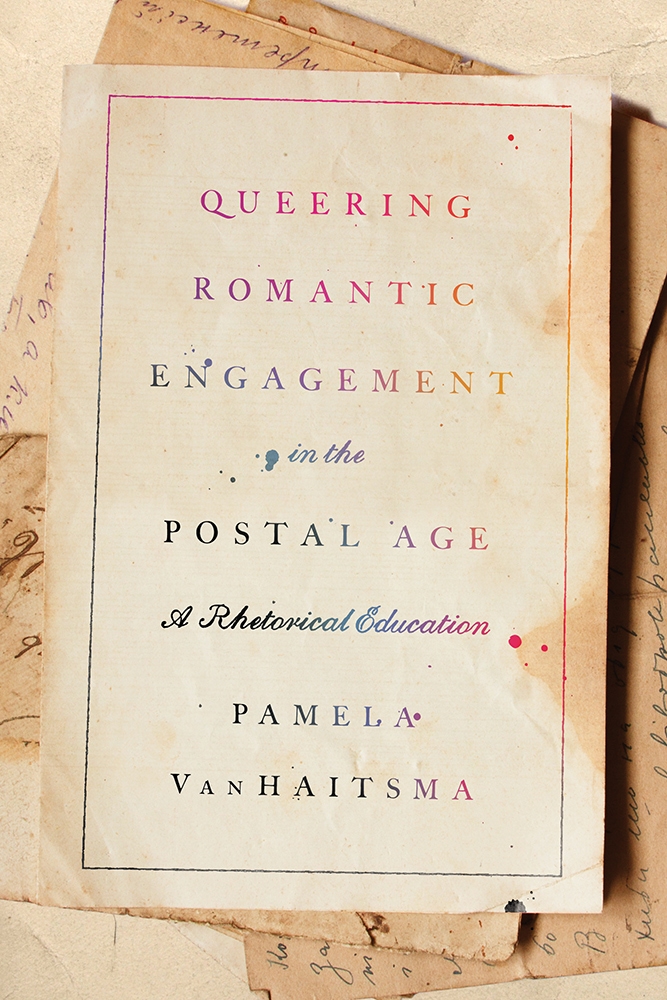Black History Month Sale: 40% off all books, plus FREE SHIPPING on all U.S. orders over $50 | Use code JBHM26

Size: 6 x 9
Pages: 176
Illustrations:
Pamela VanHaitsma
The inclusion of this book in the Open Carolina collection is made possible by the generous funding of University of South Carolina Libraries
"Queering Romantic Engagement in the Postal Age: A Rhetorical Education offers the first queer rhetorical history of nineteenth-century romantic epistolary practices in the United States This slim volume's claims are compelling and accessible, its glimpse into the queer letters of nineteenth century rhetors is utterly fascinating, and it is an excellent example of how to bring queer scholarship to bear on the field's more traditional concerns with history, citizenship, and genre."—Rhetoric Society Quarterly
"As a reader, the text was not only enjoyable, but the pages also evoked everyday queer curiosities missing and undiscovered in white Western rhetorical studies. VanHaitsma's attention to diverse learners, queer ways of being rhetorical, and queer stories of everyday people through epistolary romantic engagement is exemplary."—Rhetoric & Public Affairs
"As a book that capably straddles feminist, queer, and rhetorical scholarship, readers will find a great deal to appreciate in this concise monograph. The text's primary contribution is to rhetorical historiography, where it offers an innovative methodological approach to confronting archival absences and accounting for queer rhetorical practices that are notoriously elusive."—Journal for the History of Rhetoric
"Pamela VanHaitsma's scholarship is intentional, smart, creative, and groundbreaking. Queering Romantic Engagement in the Postal Age: A Rhetorical Education is a must-read for scholars interested in rhetorical education; the nineteenth century; archival investigation; race-class relationships; and women's, gender, and sexuality studies."—Rhetoric Review
"[A]ny course that teaches or integrates archival research methods would benefit by including Queering Romantic Engagement in the Postal Age in its curriculum...all scholars of rhetoric can benefit from VanHaitsma's queer archival methods. She invites scholars to think capaciously and creatively about archival research and the interpretation of affect within archival materials. Importantly, her approach to queering archival methods can open up new lines of questioning, highlight new relationships, and enliven the research of any scholar whose research subject has been systematically erased from archival history."—Peitho
"In this fascinating study of queer rhetorical practices in nineteenth-century romantic letters, VanHaitsma makes a significant contribution by contesting normative views of rhetorical education as preparation for civic engagement. She reframes the concept not only in terms of civic but also what she terms "romantic engagement." VanHaitsma opens rich potential for future scholarship, including "queer movement toward failure" as cultural critique.""—Suzanne Bordelon, San Diego State University
"Dear reader, prepare yourself for a romantic engagement with this delicious little book as VanHaitsma challenges conventional views on rhetorical education, the epistolary genre, and citizenship. This smart queer rhetorical history ruptures the fragile distinction between the romantic and the civic and reads as a passionate love letter to nonnormative worldmaking and possibility."—Karma R. Chávez, Arizona State University
"Pamela VanHaitsma has crafted a love letter to everyday rhetorical ingenuity of queer romance in epistolary discourse of the postal age. Her creative and critical reconsideration of non-normative romantic correspondence queers our understanding of where and how innovative "failures from the heart" have mattered."—Charles E. Morris III, Syracuse University
2020 Winifred Bryan Horner Book Award Honorable Mention awarded by the Coalition of Feminist Scholars in the History of Rhetoric & Composition
Copyright 2026
Website By Morweb.org